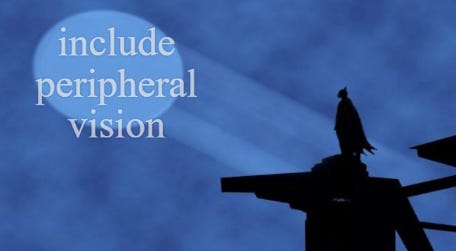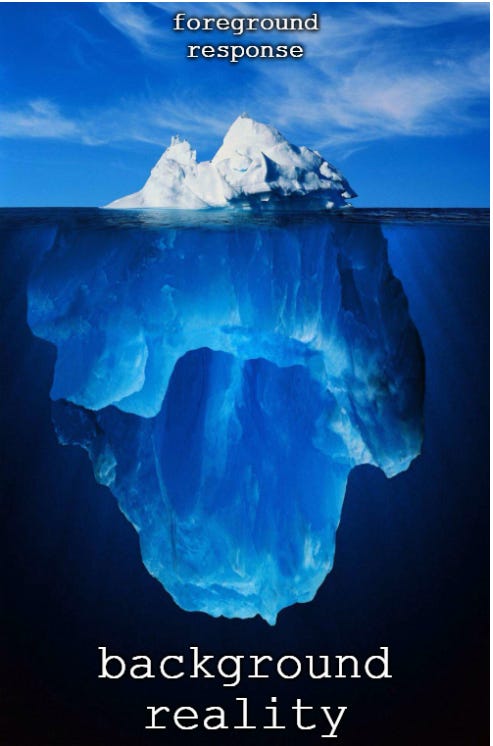unconditional love, its terms and conditions
Words are only burping sounds of your bodymind letting go.
One of the most important skills in Stemless is wide listening. It’s different from regular listening, in that you listen not just to the purported foreground of what’s being said, but also the background. What is foregrounded in someone’s words, no matter how unambiguous the words, is only an impressionistic display of their reality, of the situation they’re responding to.
In stemless, we practice (and trust) direct unsaid-background to unsaid-background intimacy.
It's like placing signs in the center of your vision that say ‘you can keep staring at this text, but widen to include your peripheral vision!’ In other words, you can still foreground things and make them explicit, but the dance is with the background.
For most people this is extremely counter-intuitive. What is the function of words, they wonder, if not to establish shared reality via explicitness?

The content of the words is less important here. What people express matters, of course, but it does not make the unsaid things less real. Indeed, here we are asked to use language to forgive ourselves for the tiny realities we make up, and in the same breath discover the laughter of pre-existing connection and freedom. Words are only burping sounds of your bodymind letting go.
You’re owning…
We’ve talked before about some drills for practicing this kind of wide speaking and listening. Take a look if you haven’t.
A newer one we’ve been trying involves, as usual, a speaker projecting at their experience directly (as an act of ownership), and the listener responding with any of three levels of wide listening. The main sentence stem is “you’re owning…” (Sometimes this is “I’m being…” when you want to lean into owning the subtle ways of being victimized.)
So, say the speaker projects at something or someone and you’re listening, and about to respond. Pick one of three options:
(As the listener) say: “You’re owning…” and then explicitly name what you can tell the speaker is implicitly owning. This doesn't have to be what the speaker is explicitly referring to; this is any aspects of experience you can tell they have a twinkly awareness about, even if only with a subtle wink.
(As the listener) say: “You’re owning…” and then name what you can see the speaker isn’t owning but should or could own, from your perception of them. Often an insecurity, fear, control, etc.
(As the listener) say: “You’re owning…” and then share how you see every aspect of the speaker’s expression as pure compassion, their existence as the brilliant radiance of pure love. Acknowledge the confidence that underlies the expression of any apparent insecurity.
For example, say you hear the speaker offer their projection to someone named Sandy, in a group: “No one can help you, Sandy.”
Listener, going with option 1: “You’re owning your concern for Sandy’s experience.” You’re sharing your knowing here, as if the speaker literally said “Hey Sandy, I feel a little concern towards you.”
Or, Listener, going with option 2: “You’re owning your teenage rebellion against dependence on others.” Here you’re offering your recognition (whether or not it is “true”) of the speaker’s failure to own their projection and subsequent agitation. In this case, the projection that Sandy is victimized by her dependence and should inhabit an “I don’t care what people think” attitude.
Or, Listener (going with option 3): “You’re owning the celebration and aliveness of every little part of us, that you see in yourself and others.” Now you’re really listening. The speaker’s momentum and expression towards Sandy is not disengagement. It is heavy engagement. The celebration is in the fact of the worth of engagement. The spice is just a flavor of the connection.
Notice what’s happening here. Once there is no prescribed foreground that must be carefully, collectively managed to reflect reality — once reality is simply allowed to be reality rather than generating a copy of it and speaker and listener shaking hands on its fidelity — the listener can let the speaker own their experience, even if the speaker generates no proof of ownership.
Inhabiting this has beautiful knock-on effects. It is possible for a whole container of practice to trust in assumed ownership without constant affirmation. This allows speakers to express more widely, to own more subtle realities with more magical words, and to thus do a more thorough job of ownership.
This particular exercise is not the practice itself. In some ways the “you’re owning…” are all ways of publicly assessing the situation for yourself, before you dive in. It’s a blow-by-blow to get used to the dance. You are, in essence, practicing paraphrasing (as one normally does when practicing listening) but of course in stemless fashion where you check with your most direct experience rather than some litigated commons. This is the source of confidence. Once you locate that, you can reply, or jam.
A chorus of ownership
As always, the fundamental question of Stemless is “What does it really take, to own your experience?”
We take a less individualistic, more nondual orientation to ownership here. The point of immature seeming “anti-ownership” language is to explore a subtler ownership. When a listener goes with option 2 above (where you allow the speaker to own even what you think they didn’t own), they are in an inquiry of ownership and what it takes: “Do I really need some overt literal acknowledgement from the speaker of their rebellious child parts? Why? Can I accompany them anyway, if I’m confident of my reality, what I can plainly see? And anyway, we’re all using reversed ways to do ownership, so maybe this is the speaker owning their child parts? Maybe I’m the one who’s not accompanying them in their subtle ownership by demanding a tight ownership-posture? Hmm…”
And of course, there is no get out of jail free card here. The point is not to stop owning your experience and leave it to the rest of the world. The point is to own your experience so deeply, that even actual facts of reality start to be owned as your experience (not too different from the time you first realized you could own your anger as yours, rather than a fact about someone else). If you’re ready for this depth of ownership — of not just feelings but even of perception — you might have to make peace with the imaginal, leave behind sanitized language and thus express your most direct, literal truths.
(That said, there also is a get out of jail free card. If one person fumbles or stops in a chorus of song, nothing too disruptive has happened. But if everyone leaves it to everyone else, the music disappears. Similarly, if there is enough of a chorus of owning and letting own, you might be able to get away with others letting you own your experience. Without a critical mass of such, we go back to pre-ownership or other regressions.)
Choice
In a work meeting I was once in, someone happened to respond to a routine “How are you doing” from me with a sincere “I was occupied with something confronting.” I smiled and said “I can see that!” He got quite excitedly suspicious at this knowing utterance. Being a rational and curious fellow, he asked “Would you have been able to predict that if I hadn't told you?”
Maybe you get the point I’m about to make already… there's something funny here, about prediction being a proof of connection. The dance of resonance in connection has little to do with accurate predictive models. It's as if he said “Look at how the light moves through the leaves over there” and I said “I can see that!” Would I have been able to “predict” the light in the leaves, if he hadn't told me? It’s easier to notice the absurdity of such a question here. What would that even mean, in this case of seeing the leaves? It was all already in our awareness, perhaps even in my (literal) peripheral vision. We only moved our attention to it and more vividness burst forth.
When you try to follow this analogy, there are many opportunities to fumble. Was I really already aware of my meeting partner’s feelings? Isn’t this idea refuted by how we misunderstand each other constantly? Remember, this practice is not centered on what happens in the foreground. We’re talking about a much wider notion of understanding, that feels like blindsight to our narrow notion of it.
The upshot of wide listening is that there cannot be any excuse to not meet everything, said or unsaid. Every expression is an act of ownership, of all of the speaker’s experience, even if buried deep in implicitness. The trail of deep burial is a deeply playful expression of ownership, the pointer to follow. It's generously revealing itself to you, offering you its truth. Any lack of awareness of playfulness on part of the speaker (as you perceive it) is an even deeper playfulness of expression.
You don’t need anyone else to explicitly own anything. You don't even need to understand what’s being said, in a conventional sense. Don’t piece it together. Give up trying to “get it” and relax completely.
With wide listening under your belt, you can’t escape direct and complete intimacy with the so-called “other.” You are invited to live the question: what does it really take, to have company in recognition of ever-present connection?
The three levels of the drill above are a particular progression into the inherent generosity of communication.
The full spectrum is always available, no matter what someone is overtly speaking "to.” You can't put it on the speaker to "make it real for everyone" via some loud proof of shared reality, of whatever aspect or quality or level you think they excluded. You can't even complain about not being accompanied in wanting to include something that is “excluded.” Regardless of how well-done you like acknowledgements from speakers to be, there is no reason to not deepen attunement as a listener. There is no invitation-policing. It’s all invitation. Don’t interrupt the jam to correct someone, just take the invitation!
With wide listening, comes choice: everything is available. So what do you jam with? What layers do you bring into expression, into reality? What do you wrap around, with all of your skin and pores?
…Fear not, this choice. Because you cannot make any of it more or less real either. It's all already there. You don't have to get it right. You can't help but respond to your situation with your entire being. Which is, remember, what it means to express yourself stemlessly; to share your implicit background. You will be listened to, and listened through.
You really can't get this wrong.1
Actually try out this practice! Say ‘hi’ at contact@stemless.org or join the WhatsApp group for an intro session (with some limited free spots)! To support this project, subscribe here.
Is all this talk of unconditional love and inherent wholeness too cloying? Does it remind you of new age positive affirmation BS? Let it be clear then, how terrifying this proposition is: nothing is as severe as unconditional love from every direction. Because then you have truly no excuse, no one to blame, for a lack of confidence in showing up as you are.


